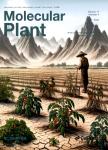Overexpression of an F-box Protein Gene Reduces Abiotic Stress Tolerance and Promotes Root Growth in Rice
Overexpression of an F-box Protein Gene Reduces Abiotic Stress Tolerance and Promotes Root Growth in Rice作者机构:State Key Laboratory of Plant Genomics Institute of Microbiology Chinese Academy of Sciences Beijing 100101 China National Plant Gene Research Center Beijing 100101 China Graduate School of the Chinese Academy of Sciences Beijing 100039 China Present address: School of Life Science and Technology University of Electronic Science and Technology of China Chengdu 610054 China State Key Laboratory of Rice Biology National Rice Research Institute Hangzhou 310006 China
出 版 物:《Molecular Plant》 (分子植物(英文版))
年 卷 期:2011年第4卷第1期
页 面:190-197页
核心收录:
学科分类:0710[理学-生物学] 07[理学] 08[工学] 09[农学] 071007[理学-遗传学] 0901[农学-作物学] 0836[工学-生物工程] 090102[农学-作物遗传育种]
基 金:中国科学院项目
主 题:Rice (Oryza sativa L.) F-box domain abscisic acid abiotic stress tolerance root growth.
摘 要:As one of the largest gene families, F-box domain proteins have important roles in regulating various devel- opmental processes and stress responses. In this study, we have investigated a rice F-box domain gene, MAIF1. The MAIF1 protein is mainly localized in the plasma membrane and nucleus. MAIF1 expression is induced rapidly and strongly by abscisic acid (ABA) and abiotic stresses. MAIF1 expression is also induced in root tips by sucrose, independent of its hy- drolytic hexose products, glucose and fructose, and the plant hormones auxin and cytokinin. Overexpression of MAIF1 reduces rice ABA sensitivity and abiotic stress tolerance and promotes rice root growth. These results suggest that MAIF1 is involved in multiple signaling pathways in regulating root growth. Growth restraint in plants is an acclimatization strategy against abiotic stress, Our results also suggest that MAIF1 plays the negative role in response to abiotic stress possibly by regulating root growth.



